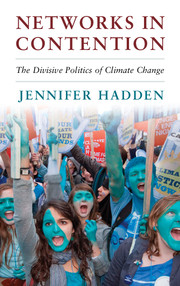Book contents
- Frontmatter
- Dedication
- Contents
- List of Figures
- List of Tables
- Acknowledgments
- Introduction
- 1 The Copenhagen Moment
- 2 The Emergence of a Divided Civil Society Network
- 3 A Network Approach to Collective Action
- 4 Conventional Climate Advocacy
- 5 Climate Justice Activism
- 6 Implications for Climate Change Politics
- Conclusion
- Main Abbreviations Used
- Methods Appendix
- References
- Index
- Books in the Series
2 - The Emergence of a Divided Civil Society Network
Published online by Cambridge University Press: 05 April 2015
- Frontmatter
- Dedication
- Contents
- List of Figures
- List of Tables
- Acknowledgments
- Introduction
- 1 The Copenhagen Moment
- 2 The Emergence of a Divided Civil Society Network
- 3 A Network Approach to Collective Action
- 4 Conventional Climate Advocacy
- 5 Climate Justice Activism
- 6 Implications for Climate Change Politics
- Conclusion
- Main Abbreviations Used
- Methods Appendix
- References
- Index
- Books in the Series
Summary
Chapter 1 documented how participation in climate change politics dramatically increased in advance of the Copenhagen Summit. There are many reasons to expect that increased participation would lead to better performance on the part of civil society networks. Civil society groups themselves actively court new members and partners. The UNFCCC routinely encourages participation and emphasizes the contributions that civil society actors can make to improve climate change policy making (United Nations Framework Convention on Climate Change 2010). The basic logic here is simple: with more resources and more expertise, we should expect civil society to be more effective and, in turn, to exercise more influence on climate policy.
This chapter tells a different story. I argue that to understand the implications of civil society participation, we need to understand not only the number of groups but also the relations between them. In the climate case, as groups became more numerous, the divisions between them became deeper. Barbara Unmussig reflected on this issue for the Green Political Foundation in 2011:
For many years, the belief has survived that we are one global civil society, which – in a historic mission – will save the world in light of the universal failure of state policies … At the same time, the international climate negotiation process highlights how large the conflicts of interest among civil society actors have now become in terms of geography, positions, and ideologies. There can no longer be any talk of strength through unity, of harmony of positions.
(Unmussig 2011)The types of divisions that emerged in the climate case are probably not uncommon: other scholars have written about conflict and division within populations of transnational activists (Johnson 1999; Maney 2001; Nelson 2002; Hertel 2006; Bob 2012; Cooley and Ron 2001; Smith 2008; Tarrow 2005 b; della Porta and Tarrow 2005).
- Type
- Chapter
- Information
- Networks in ContentionThe Divisive Politics of Climate Change, pp. 38 - 62Publisher: Cambridge University PressPrint publication year: 2015



